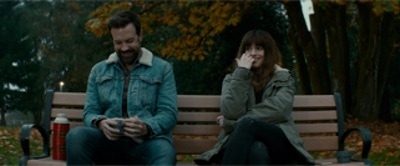Nacho Vigalondo’s Colossal is not a film that is terribly interested in explaining things, which probably is for the best in a movie about a woman connected to a kaiju that appears out of nowhere to threaten a major world city. While that means we aren’t getting bogged down in explaining things that don’t really make sense, is also means the setup for the story feels rushed. In a few whirlwind minutes, party girl in crisis, Gloria, played with blowzy intensity by Anne Hathaway, has been booted out of her apartment with Cousin Matthew, sorry, Tim (a boorish turn by heartthrob Dan Stevens), gone back to an empty house in her small hometown, reconnected with childhood acquaintances, and is employed in a bar.
Jason Sudeikis brings his trademark buttoned up affability to the role of Oscar, that bar’s owner. In the early going, Gloria’s days are filled with hangovers and regret, while her nights are spent in the bar drinking and shooting the breeze with Oscar and his buddies(?), though like so many things, it’s never entirely clear why Garth (Tim Blake Nelson) and Joel (Austin Stowell) are around, let alone why they are allowed to stick around and keep drinking after the bar is closed. It’s not hard to understand why Gloria is there: she’s beautiful and she can hold her liquor, though she can’t always remember what happens afterward, which is how she misses the first appearance of the biggest news story of the century: a giant monster materializing in Seoul and wreaking havoc.

It isn’t exactly clear how Gloria cottons on to the idea that the mysterious monster might actually be . . . her(ish). However it happens, we spend a good deal of time with her solo efforts to prove that idea to herself. In lesser hands, we might all be checking out at this point, but Hathaway’s charming, stumbling industriousness carries us through this section of the film as Colossal grows into its metaphors. The film is also invigorated by the way that Vigalondo and Eric Kress, his cinematographer, incorporate the world of our second screens into the movie. Smartphones and tablets are ubiquitous in America these days, a fact of people’s existence so basic as to be forgotten.
It’s encouraging to watch a movie about a subject, MONSTER! DESTRUCTION!, that would surely feature on the evening news and YouTube if it were real. Kress and Vigalondo shows us what is on those screens, as part of the language of the film, and not just as things that people look at. There are a number of times when we can see Gloria and her monster moving in tandem, one present and one on screen, but still together, including the visually expressive confirmation of Gloria’s hypothesis about her control of the kaiju on the morning news. Vigalondo and Kress get a lot of use out of thinking about the proximity and distance that consuming reality through a device creates. It’s a natural way to explore the distant consequences of local actions, a major theme in this movie about a few drunk people in a playground in the middle of nowhere who have more power than they know what to do with.
If the early part of this film feels like a slightly quirky take on the values of returning home from the big city and discovering the weight of time in rural America but with monsters, sort of, don’t get too worried; Vigalondo, who wrote as well as directed the film, is not interested in making Sweet Home Alabama but with kaiju. What appear to be character quirks or inconsistencies are slowly revealed to be more serious, sinister, and profound than they first appear and the personal stakes grow, well, colossal. The film travels to a much darker place than the first act appears to promise, which is all for the best, especially if you find yourself constantly irritated by Hollywood’s casual and usually unremarked misogyny and addiction to toxic masculinity.
As the film bleakens, it gets much more interesting, shedding its quirks for much weightier explorations of power, responsibility, guilt and trauma, which it would be a shame to spoil here. Vigalondo may not have completely figured out how to explain the metaphor he is working with between the monsters and the misogyny and the alcoholism and the gigging economy blues, but if you get on his wavelength and don’t ask too many questions, he manages to make some trenchant points on all those subjects in the end.
Colossal takes an unconventional path through dark passes, with a non-zero chance that some audience members will get lost along the way, but Vigalondo ends up in a fascinating and idiosyncratic place that’s worth the trip.
Colossal is rated R.
Running Time: One hour and 50 minutes.
Now open in D.C. area theaters, check your local listings. Get tickets through Fandango or sheiscolossal.




